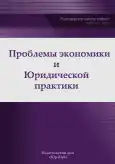Ensuring the National Security of the Russian Federation: Theoretical and Legal Aspect
- Authors: Bondarenko S.I.1, Shuisky V.A.2
-
Affiliations:
- Pyatigorsk Institute (branch) of the North Caucasus Federal University
- Financial University under the Government of the Russian Federation
- Issue: Vol 18, No 1 (2022)
- Pages: 16-19
- Section: Articles
- URL: https://bakhtiniada.ru/2541-8025/article/view/147376
- ID: 147376
Cite item
Abstract
Full Text
##article.viewOnOriginalSite##About the authors
Svetlana I. Bondarenko
Pyatigorsk Institute (branch) of the North Caucasus Federal University
Email: bonja00.85@mail.ru
Cand. Sci. (Hist.), Associate Professor, department of state and legal disciplines Pyatigorsk, Russian Federation
Vladimir A. Shuisky
Financial University under the Government of the Russian Federationfaculty of law Moscow, Russian Federation
References
- The Constitution of the Russian Federation (adopted by popular vote on 12.12.1993 with amendments approved during the all-Russian vote on 01.07.2020) [Electronic resource] // Official Internet portal of legal information.-URL: http://www.pravo.gov.ru, 04.07.2020.
- Federal Law No. 390-FZ of 28.12.2010 (ed. of 09.11.2020) «On Security» // Collection of Legislation of the Russian Federation. 2011. No. 1. Article 2.
- Decree of the President of the Russian Federation No. 400 dated 02.07.2021 «On the National Security Strategy of the Russian Federation» // Collection of Legislation of the Russian Federation. 2021. No. 27 (Part II). Article 5351.
- Alexandrov I.A. On the issue of changes in the national security strategy of the Russian Federation in 2021 // Vector of Science of Togliatti State University. Series: Legal Sciences. 2021. No. 3 (46). pp. 5-10.
- Antoshin V.A., Pilyavsky A.P. Development of conceptual and regulatory frameworks for ensuring national and public security of the Russian Federation // Strategies for the development of social communities, institutions and territories. / Materials of the II International Scientific and Practical Conference: in 2 volumes. Yekaterinburg: Ural Federal University named after the first President of Russia B. N. Yeltsin, 2016. pp. 143-151.
- Verbitskaya T.V. National security as an institute of constitutional law : Monograph.-M.: Mir Nauki, 2015. 94 p.
- Gribakova Ya.Yu. New aspects of ensuring the national security of the Russian Federation in the context of globalization [Electronic resource] // Scientific research journal «Economic Research and Development». 2019. URL: http://edrj.ru/article/13-01-2019.
- Konkin V.S. National security of modern Russia // Bulletin of the Saratov State Law Academy. 2012. No. 6 (89). pp. 60-63.
- Malyshev A.S. National security of Russia in the modern world [Electronic resource] // Scientific and methodological electronic journal «Concept». 2016. Vol. 11. pp. 2291-2295. URL: http://e-koncept.ru/2016/86487.htm.
- Tonkikh V. A. National security of Russia in the conditions of modern challenges and threats // Young scientist. 2017. No. 11 (145). pp. 404-408.
- Usmonova N. R. Legal provision of national security of the Russian Federation // Young Scientist. 2018. No. 44 (230). pp. 189-191.
Supplementary files








